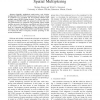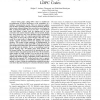63 search results - page 8 / 13 » Error Exponents of Optimum Decoding for the Interference Cha... |
150
Voted
TWC
2010
14 years 9 months ago
2010
The goal of this paper is to explore the benefits of channel diversity in wireless ad hoc networks. Our model is that of a Poisson point process of transmitters, each with a recei...
132
Voted
GLOBECOM
2006
IEEE
15 years 8 months ago
2006
IEEE
— Spatially multiplexed multi-carrier code division multiplexing (SM-MC-CDM) communications with turbo coding is considered over correlated and uncorrelated multiple input multip...
114
Voted
TIT
2002
15 years 2 months ago
2002
This paper is devoted to a Shannon-theoretic study of turbo codes. We prove that ensembles of parallel and serial turbo codes are "good" in the following sense. For a tur...
112
Voted
CORR
2010
Springer
15 years 2 months ago
2010
Springer
Dirty paper coding (DPC) refers to methods for pre-subtraction of known interference at the transmitter of a multiuser communication system. There are numerous applications for DPC...
99
Voted
ICASSP
2010
IEEE
15 years 2 months ago
2010
IEEE
Abstract—Channel shortening filters have been used in acoustics to reduce reverberation, in error control decoding to reduce complexity, and in communication systems to reduce i...


